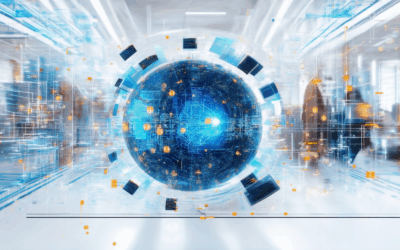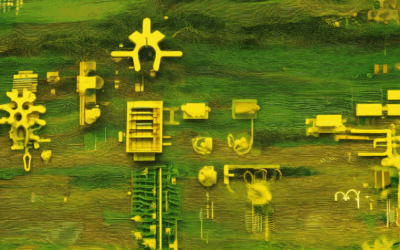As the digital landscape continues to evolve, businesses are faced with unprecedented opportunities and challenges. The year 2023 has brought forth a wave of fresh perspectives and innovative strategies that are reshaping how organizations connect with their audiences. From artificial intelligence-driven personalization to the rise of interactive content, the latest trends in digital marketing are redefining traditional approaches and setting new standards for success. With the ever-changing dynamics of consumer behavior and technological advancements, staying ahead requires a deep understanding of the emerging trends in digital marketing. This article delves into the most significant shifts impacting the industry, exploring how businesses can adapt to these changes and leverage them to achieve their goals. Whether you’re looking to refine your existing strategy or explore cutting-edge solutions, this guide offers valuable insights into the future of digital marketing.

Latest Trends in Digitalization
Digitalization continues to evolve rapidly, shaping industries, businesses, and daily life. Here are the most prominent trends driving this transformation in 2025 and beyond:
- Artificial Intelligence (AI) and Machine Learning (ML): These technologies remain central to digital transformation, enabling advanced automation and intelligent decision-making. AI-driven tools are now integral to everything from customer service to manufacturing processes.
- Cloud Computing and SaaS Models: The shift toward cloud-based solutions has accelerated, with companies adopting hybrid and multi-cloud strategies to optimize scalability and cost-efficiency. Software-as-a-Service (SaaS) platforms continue to dominate various sectors.
- Sustainability and Green Digitalization: As environmental concerns grow, digital solutions are increasingly focused on sustainability. Technologies like renewable energy integration, smart grids, and circular economy models are driving eco-friendly digital transformations.
- Blockchain Technology: Beyond cryptocurrencies, blockchain is being adopted in healthcare, supply chain, and voting systems for secure, decentralized solutions. Its potential for transforming trust in digital systems remains immense.
- Augmented Reality (AR) and Virtual Reality (VR): AR and VR are becoming mainstream, enhancing customer experiences in retail, gaming, and education. Their applications in training simulations and virtual meetings are expanding rapidly.
- Remote Work and Collaboration Tools: The pandemic has cemented remote work as a permanent feature of the modern workforce. Tools like Zoom, Slack, and Microsoft Teams have become indispensable for global teams.
- Data Analytics and AI-Powered Insights: Organizations are leveraging AI and machine learning to extract actionable insights from vast datasets. Predictive analytics is now standard across industries, driving informed decision-making.
- Cybersecurity and Zero Trust Architecture: With increasing cyber threats, robust cybersecurity measures are critical. Zero Trust frameworks are gaining traction, focusing on continuous verification rather than traditional perimeter security.
- Edge Computing: The rise of edge computing enables real-time data processing closer to the source, reducing latency and enhancing efficiency for applications like autonomous vehicles and IoT devices.
Future Predictions
Looking ahead, the convergence of these technologies promises exciting developments:
- Hyper-Personalization: AI will enable highly personalized experiences, tailoring products and services to individual preferences across industries.
- Decentralized Finance (DeFi): Blockchain and smart contracts will disrupt traditional financial systems, offering new ways to manage money and access financial services.
- Space Exploration and Digitalization: As humanity ventures further into space, digital technologies will play a pivotal role in sustaining missions and exploring new frontiers.
Digitalization is not just a trend—it’s a transformative force reshaping our world. By embracing these innovations thoughtfully, we can unlock new possibilities and create a more connected, efficient, and sustainable future.
Biggest Trend in Digital Marketing Now
Digital marketing continues to evolve rapidly, with several major trends emerging in 2025. One of the most prominent is the integration of artificial intelligence (AI) and machine learning into marketing strategies. These technologies enable unprecedented levels of data analysis, personalization, and automation, allowing marketers to deliver highly targeted campaigns and optimize ad performance in real-time.
Video marketing is another significant trend, with platforms like TikTok, YouTube, and Instagram prioritizing video content. Brands are increasingly investing in video ads, influencer collaborations, and educational content to capture the attention of visually oriented audiences.
Social commerce is also on the rise, with social media platforms introducing features that allow users to purchase products directly within feeds. This trend is expected to grow as more brands leverage these channels to create seamless shopping experiences.
Data privacy and compliance with regulations like GDPR and CCPA are shaping marketing strategies, requiring brands to adopt transparency and encryption practices to protect consumer data. This shift is driving a greater emphasis on trust-building and ethical marketing practices.
Additionally, interactive content such as quizzes, polls, and gamification is gaining traction as a way to engage audiences more deeply. This approach not only boosts engagement but also helps in lead generation and conversion.
Leading companies like Google, Facebook, and Amazon are investing heavily in these areas, while startups are focusing on niche solutions within these trends. The convergence of AI, video, and social commerce presents a unique opportunity for businesses to innovate and stand out in the market.
As digital marketing continues to advance, staying adaptable and open to new technologies will be crucial for success. Businesses that can effectively blend AI-driven insights with creative, personalized, and secure marketing strategies are poised to thrive in the coming years.

What Are Digital Trends?
Digital trends refer to the ongoing changes and innovations in technology, business, and society that shape how we live, work, and interact. These trends are driven by advancements in technology, shifts in consumer behavior, and the evolution of industries. Here are some key areas defining modern digital trends:
- Technological Innovations :
- Artificial Intelligence (AI) : AI continues to revolutionize industries through machine learning, natural language processing, and automation.
- Augmented Reality (AR) and Virtual Reality (VR) : These technologies are transforming gaming, education, and marketing by creating immersive experiences.
- Internet of Things (IoT) : The connectivity of devices is enabling smarter homes, cities, and industrial systems.
- Blockchain Technology : Known for powering cryptocurrencies, blockchain is also being used in supply chain management and decentralized applications.
- Quantum Computing : Emerging as a potential game-changer in fields like cryptography and drug discovery.
- Digital Transformation in Business :
- Businesses are increasingly adopting digital tools to enhance efficiency and customer engagement. Key tools include:
- Customer Relationship Management (CRM) Systems : Used to manage interactions and track customer journeys.
- Cloud Computing : Enabling remote work, data storage, and software access.
- E-commerce Platforms : Facilitating online sales and omnichannel shopping experiences.
- Digital transformation is driving innovation in industries like healthcare, education, and manufacturing.
- Shifts in Consumer Behavior :
- Consumers are moving towards online interactions, influenced by social media, streaming services, and mobile apps.
- E-commerce is growing rapidly, with platforms like Amazon and Shopify leading the charge.
- Personalization is becoming essential, with brands using data analytics to tailor products and services.
- Emergence of New Platforms :
- Social media giants like Meta (Facebook), Twitter, and TikTok dominate the digital landscape, shaping cultural trends and marketing strategies.
- New platforms like Twitch and Discord are disrupting traditional media consumption patterns.
- Focus on Sustainability and Ethics :
- Digital trends are increasingly emphasizing sustainability. Companies are adopting green technologies and reducing their carbon footprints.
- Ethical considerations, particularly around AI and data privacy, are becoming critical as societies grapple with the consequences of digital advancements.
- Predictions for the Future :
- Experts predict continued innovation in areas like Web3 (decentralized internet), the metaverse, and advanced analytics.
- The convergence of AI, IoT, and blockchain could lead to transformative solutions across industries.
By staying attuned to these trends, businesses and individuals can better navigate the evolving digital landscape and capitalize on opportunities for growth.
Explore Iterati’s insights on digital transformation and innovation.

The Top 13 Emerging Technologies
As we navigate the rapidly evolving technological landscape, it’s essential to stay informed about the most promising innovations shaping our future. Below is a curated list of the top 13 emerging technologies that are reshaping industries and society:
- Artificial Intelligence (AI): From machine learning to natural language processing, AI continues to revolutionize how businesses operate and how people interact. Its applications span various sectors, including healthcare, finance, and entertainment.
- Blockchain Technology: Known for powering cryptocurrencies like Bitcoin, blockchain is also being explored for supply chain management, secure identity verification, and decentralized systems.
- Virtual Reality (VR) and Augmented Reality (AR): These immersive technologies are transforming gaming, education, and marketing, offering users unparalleled interactive experiences.
- Quantum Computing: Still in its early stages, quantum computing promises to solve complex problems much faster than traditional computers, potentially revolutionizing fields like cryptography and drug discovery.
- Bioprinting: This groundbreaking technology aims to print living cells, paving the way for personalized medicine and tissue engineering.
- Neurotechnology: Combining neuroscience with engineering, neurotechnology seeks to enhance human capabilities, treat neurological disorders, and develop advanced brain-computer interfaces.
- Sustainable Energy Storage: Innovations in battery technology, such as solid-state batteries and lithium-ion alternatives, are crucial for addressing global energy demands and reducing environmental impact.
- Space Exploration Technologies: Companies like SpaceX are pushing the boundaries of space travel, making commercial space missions more accessible and affordable.
- Circular Economy Technologies: Technologies promoting sustainability, such as recycling machines and renewable energy systems, are driving the shift towards a circular economy.
- Advanced Robotics: Robots are becoming more autonomous and adaptable, finding applications in manufacturing, healthcare, and personal assistance.
- Gene Editing (CRISPR): CRISPR-Cas9 technology is being used to edit genes, offering potential cures for genetic diseases and improvements in agricultural practices.
- 5G Networks: The rollout of 5G networks is enabling faster connectivity, supporting the growth of IoT devices and enhancing communication technologies.
These technologies are not just futuristic concepts—they are actively shaping our present and future. Staying informed about these innovations can help you stay ahead in your field and understand the trends driving global progress.
Which Technology is Booming Now?
Artificial Intelligence (AI), Machine Learning, and Quantum Computing are among the most rapidly growing technologies today. These fields are driving innovation across industries, from healthcare to finance, and are reshaping how we live and work.
- Artificial Intelligence (AI): AI continues to dominate the tech landscape, with advancements in natural language processing, computer vision, and autonomous systems. Companies like Iterati are leveraging AI to solve complex problems and enhance decision-making processes.
- Quantum Computing: Quantum computers promise to revolutionize fields like cryptography, drug discovery, and optimization. While still in early stages, companies like IBM and Google are leading the charge in developing quantum systems.
- Blockchain Technology: Blockchain, known for its role in cryptocurrencies, is expanding into supply chain management, decentralized finance (DeFi), and digital identity solutions. Platforms like Ethereum are driving innovation in this space.
- Cybersecurity: As digital transformation accelerates, cybersecurity threats grow. Companies specializing in AI-driven threat detection, like CrowdStrike , are in high demand to protect sensitive data and infrastructure.
- Biotechnology: Advances in gene editing, CRISPR technology, and personalized medicine are transforming the biotech industry. Startups like CRISPR Therapeutics are at the forefront of these innovations.
These technologies are not just trends—they are transformative forces shaping our future. Staying informed about their developments and applications is crucial for anyone looking to stay ahead in the ever-evolving tech landscape.

The Essential 8 Emerging Technologies
The Essential Eight represents a collection of transformative technologies shaping today’s digital landscape. These technologies are selected for their potential to revolutionize industries, drive innovation, and solve complex global challenges. Below is a detailed breakdown of each:
- 1. Artificial Intelligence (AI)
- 2. Internet of Things (IoT)
- 3. Blockchain Technology
- 4. Virtual Reality (VR) and Augmented Reality (AR)
- 5. Advanced Robotics
- 6. Quantum Computing
- 7. Neuromorphic Engineering
- 8. Edge Computing
AI continues to dominate technological advancements, driving progress in machine learning, natural language processing, and automation. Its applications span healthcare diagnostics, autonomous vehicles, and personalized education systems.
The IoT connects everyday devices to the internet, enabling smart homes, industrial automation, and city-wide management systems. It’s integral to modern logistics and urban planning.
Blockchain has emerged as a secure and decentralized ledger system, revolutionizing finance, supply chain, and data security. Its immutability ensures trust and transparency across various sectors.
VR and AR are transforming entertainment, education, and training simulations. Their integration with gaming and real-time applications is driving immersive experiences and enhanced productivity.
Robots are becoming more intelligent and versatile, with applications in manufacturing, delivery services, and healthcare. They are redefining efficiency and precision in diverse fields.
Quantum computers promise to solve complex problems faster than classical computers. Companies like IBM and Google are leading breakthroughs in this field, with implications for cryptography and material science.
Neuromorphic engineering focuses on emulating the human brain’s capabilities, creating energy-efficient AI systems. This technology is advancing bio-inspired robotics and adaptive hardware solutions.
Edge computing brings computation and data storage closer to the location where it’s needed, reducing latency and improving real-time decision-making. It’s crucial for autonomous vehicles and smart cities.
Conclusion: These technologies collectively redefine how we live, work, and interact. Staying informed about their advancements and applications is essential for anyone aiming to thrive in the modern era.




0 Comments